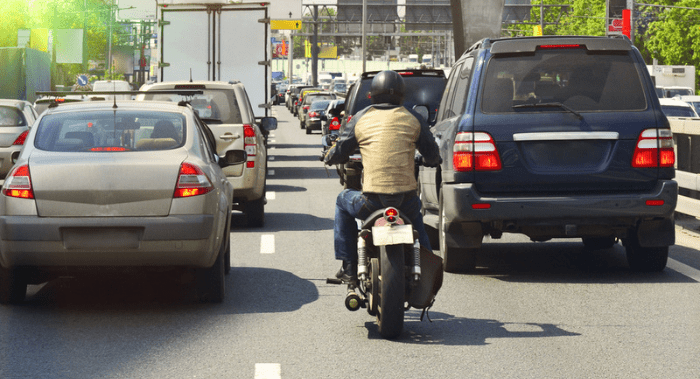Complete the form to schedule a free consultation with a traffic lawyer
Is Lane-Splitting with a Motorcycle Illegal?

If you’re a motorcycle rider, you may have heard of the term “lane splitting.” This refers to the practice of riding between lanes of stopped or slow-moving traffic, often to get ahead in congested areas. But did you know that the legality of lane splitting varies greatly across the United States? In this article, we’ll explore the different lane-splitting laws across the country, where it’s allowed, and where it’s illegal, as well as the potential consequences of violating those laws.
California: The Only State Where Lane Splitting is Legal
California is the only state in the US where lane splitting is explicitly legal, and there are even specific laws that regulate it. According to the California Highway Patrol (CHP), lane splitting is defined as “riding a motorcycle between rows of stopped or moving vehicles in the same lane.” The CHP also provides guidelines for safe lane splitting, which include riding at a speed that is no more than 10 mph faster than the surrounding traffic, and only splitting lanes when traffic is moving at speeds of 30 mph or less.
While lane splitting is legal in California, that doesn’t mean it’s always safe. Motorcyclists must always ride defensively and be aware of their surroundings, as well as anticipate the movements of other drivers. Additionally, drivers of other vehicles must also be aware of motorcyclists who may be lane splitting and give them enough space to do so safely.
States Where Lane-Splitting is Ambiguous
In most other states, lane splitting is not explicitly legal, which means that it’s generally considered illegal by default. However, there are a few states that have laws or policies that are ambiguous or allow for some form of lane splitting in certain situations.
For example, in Utah, lane filtering is allowed in certain circumstances, which refers to riding between lanes of traffic that are stopped at a red light or stop sign. However, this is only allowed on roads with a speed limit of 45 mph or less, and the motorcyclist cannot travel more than 15 mph while doing so.
In Oregon, there is no specific law that addresses lane splitting, but the state’s Driver and Motor Vehicle Services (DMV) website notes that “drivers should never create an unsafe situation for a motorcyclist,” which could be interpreted as allowing for some form of lane splitting.
States Where Lane-Splitting is Illegal
In all other states, lane splitting is generally considered illegal, and motorcyclists can face serious consequences if caught doing so. The penalties for lane-splitting violations vary by state, but they can include fines, points on your driver’s license, and even jail time in some cases.
For example, in Florida, lane splitting is considered a “moving violation,” which can result in a fine of up to $1,000, points on your driver’s license, and even the suspension or revocation of your license.
In Georgia, lane splitting is considered reckless driving, which is a misdemeanor offense that can result in up to one year in jail, fines up to $1,000, and the suspension of your license.
Conclusion: Know the Laws and Ride Safely
The legality of lane splitting varies greatly across the United States. While it’s only explicitly legal in California, there are a few states that have ambiguous or limited laws that may allow for some form of lane splitting. However, in most states, lane splitting is considered illegal and can result in serious consequences if caught.
As a motorcycle rider, it’s important to know the laws in your state and ride safely and responsibly. This means riding defensively, wearing proper safety gear, and being aware of your surroundings at all times. Additionally, drivers of other vehicles must also be aware of motorcyclists who may be lane splitting and give ample room to avoid unsafe situations.
If you have received a traffic ticket for distracted driving or any other offense, then use TicketVoid.com’s free attorney matching service to get in touch with a lawyer who may be able to represent you in court and protect you from penalties such as hefty fines and jail time.
